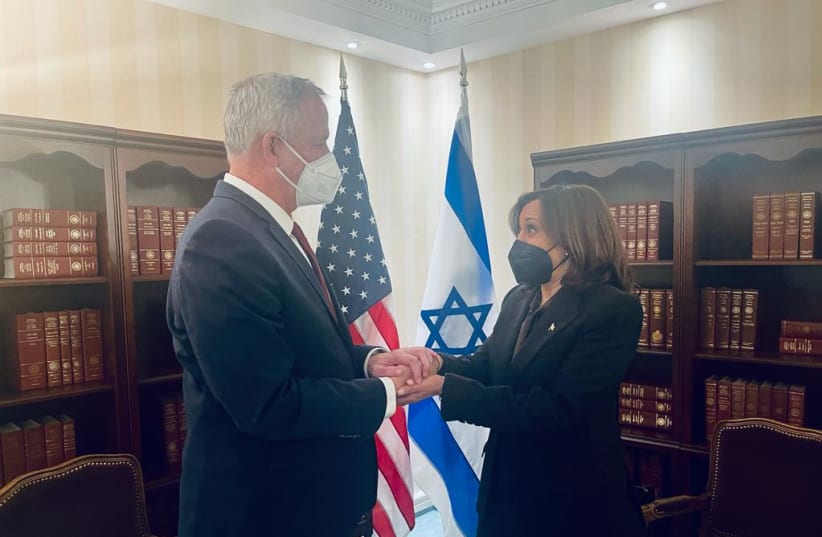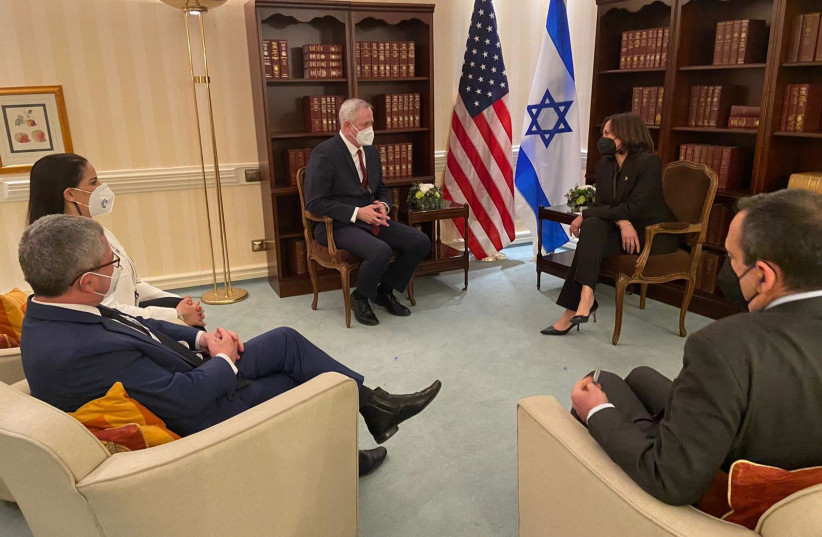Any revival of the 2015 Iran nuclear deal must allow for the International Atomic Energy Agency to monitor compliance, Defense Minister Benny Gantz told US Vice President Kamala Harris when they met Saturday night on the sidelines of the Munich Security Conference.
“I expressed my gratitude to US President [Joe] Biden and the VP for their commitment to preventing a nuclear Iran,” Gantz said after the meeting. “I told her that any future agreement must include consistent enforcement by the IAEA in addition to handling the open files in the nuclear program.”
Gantz is in Munich to both address the conference on Sunday and to hold wide-ranging diplomatic meetings on the possibility on the pending Iran deal, the possible Russian invasion of Ukraine, the Abraham Accords and the stalled Israeli-Palestinian conflict.
The defense minister said he also thanked Harris for the important role played by the United States in maintaining stability in the Middle East, in the face of regional aggression perpetrated by Iran and its proxies. They also discussed the importance of expanding the Abraham Accords, the situation in the Ukraine, and the importance of pursuing confidence-building measures with the Palestinians.
He said that he also “updated the VP on a series of steps I plan to take in order to deepen cooperation with our neighbors in the region.”
Israel is braced for the possibility that the United States is prepared as early as possibly this week to accept a watered-down revival of the 2015 Joint Comprehensive Plan of Action signed between Tehran and the six world powers: the US, Russia, China, Germany, France and Great Britain.
The former Trump administration exited the deal in 2018, and the Biden administration has sought to rejoin it through a negotiation process held in Vienna.
Israel opposed the original agreement and opposes its revival, especially now that the deal is expected to be weaker.
A senior European Union official said on Friday that a US-Iranian deal was close but success depended on the political will of those involved.
“I expect an agreement in the coming week, the coming two weeks or so,” the EU official said. “I think we have now on the table text that is very, very close to what is going to be the final agreement.”
Reuters reported on Thursday details of a possible deal negotiated by envoys from Iran, Russia, China, Britain, France, Germany, the European Union and the US.
Iranian Foreign Minister Hossein Amirabdollahian told the Munich Security Conference that indirect talks between Tehran and Washington could succeed “at the earliest possible time” if the US makes the necessary political decisions.
“I would like to emphasize here that we are ready to achieve a good deal, at the earliest possible time, if the other side makes the needed political decision,” Amirabdollahian said in a panel session.
Establishing security and calm in the Middle East was possible with the participation of regional countries, “without foreign interference,” he said.
Iran also said it is ready to swap prisoners with the United States.
“We believe prisoner swaps is a humanitarian issue... unrelated to the nuclear accord. We can do it immediately,” Iran's foreign minister told a panel at the conference.
“If the nuclear talks between Tehran and world powers fail in Vienna, Western powers will be responsible for it because we want a good deal,” he said.
When asked whether Tehran was ready to hold direct talks with Washington, Amirabdollahian refrained from ruling it out, saying: “We need to see tangible steps of goodwill by Washington such as freeing Iran’s frozen assets abroad.”
Gantz arrived in Munich on Friday and has met with Greek Prime Minister Kyriakos Mitsotakis and Defense Minister Nikos Panagiotopoulos, Finnish Defense Minister Antti Kaikkonen, Georgian Prime Minister Irakli Garibashvili, World Economic Forum president Børge Brende, Bahrain’s Deputy Minister of Foreign Affairs Abdullah Bin Hamad Al Khalifa, and German Foreign Minister Annalena Baerbock and Defense Minister Christine Lambrecht.
On Sunday he will meet with French Minister of the Armed Forces Florence Parly and the UK’s Secretary of State for Defense Ben Wallace.
Reuters contributed to this report.

